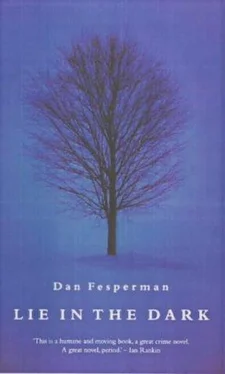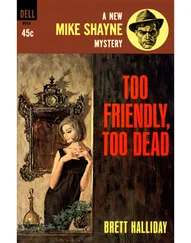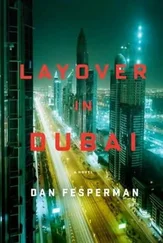Dan Fesperman - Lie in the Dark
Здесь есть возможность читать онлайн «Dan Fesperman - Lie in the Dark» весь текст электронной книги совершенно бесплатно (целиком полную версию без сокращений). В некоторых случаях можно слушать аудио, скачать через торрент в формате fb2 и присутствует краткое содержание. Жанр: Триллер, на английском языке. Описание произведения, (предисловие) а так же отзывы посетителей доступны на портале библиотеки ЛибКат.
- Название:Lie in the Dark
- Автор:
- Жанр:
- Год:неизвестен
- ISBN:нет данных
- Рейтинг книги:3 / 5. Голосов: 1
-
Избранное:Добавить в избранное
- Отзывы:
-
Ваша оценка:
- 60
- 1
- 2
- 3
- 4
- 5
Lie in the Dark: краткое содержание, описание и аннотация
Предлагаем к чтению аннотацию, описание, краткое содержание или предисловие (зависит от того, что написал сам автор книги «Lie in the Dark»). Если вы не нашли необходимую информацию о книге — напишите в комментариях, мы постараемся отыскать её.
Lie in the Dark — читать онлайн бесплатно полную книгу (весь текст) целиком
Ниже представлен текст книги, разбитый по страницам. Система сохранения места последней прочитанной страницы, позволяет с удобством читать онлайн бесплатно книгу «Lie in the Dark», без необходимости каждый раз заново искать на чём Вы остановились. Поставьте закладку, и сможете в любой момент перейти на страницу, на которой закончили чтение.
Интервал:
Закладка:
He mixed his own cup of coffee, making sure to make his own just as weak as the cups he’d stirred for his guests, and as he went through the motions a thought returned to him unbidden from his final moments of sleep. His mind had been sorting, culling, searching through the previous evening’s conundrums. But now, with his first sip of coffee, the solution came to him: There would be a way to get a full copy of the transfer file, and he could get it before Murovic, or even UNESCO. And it would not have to depend on the aging memory of Milan Glavas. But it would require a satellite phone and a fax machine, on a line without a government minder or eavesdropper, and for either of those he’d have to visit the Holiday Inn.
The phones there could be scanned, too, but the odds were far better than with any official phone, especially considering the number of journalists who called in and out at all hours of the day.
He tried again to call Damir, but if the lines had come back on overnight, the explosion had knocked them back off in his neighborhood here. So he pulled on his boots and coat, then headed out the door.
Far across the makeshift field of graves he saw his family of neighbors, heads bobbing, small vapors of breath rising from them as they worked their way up the hill toward the hospital.
The Holiday Inn had become the lodging of choice for visiting journalists and international celebrities, mostly because it was the only choice. Virtually every other hotel of appreciable size had been shuttered or shelled out of existence, and under current conditions no Hiltons or Hyatts would be breaking ground anytime soon. So, on most every night the Holiday Inn had a full house, despite its precarious location three hundred yards from the frontline.
The hotel’s garish facade, the color of an egg yolk, looked out across Sniper Alley and the Miljacka River into the blind stares of Grbavica’s empty, windowless highrises, where snipers and grenade crews did a brisk business of sighting and shooting, lighting the place up at night with red streams of tracer fire, and the yellow bursts of launched grenades.
The result was that virtually every one of the hotel’s rooms across the front, or south, side was uninhabitable. The same was true for some on the east side, with gaping shell holes in the walls.
Vlado remembered the hotel fondly from 1984, when it was not only new but the hub of all social life associated with Sarajevo’s Winter Olympics. He’d been a single man in his early twenties, partying lustily and late at the overcrowded disco, drinking to the throb of sound and light, then wobbling home, often as not with a girl on his arm from some other part of the world, putting his good English to the best possible use, all of those studies finally paying off.
In those few precious weeks somehow the city had functioned as never before, with miraculously working phones, television signals crisp and clear, and a tram system that sparkled and ran impeccably on schedule. With that had come a certainty that, with Tito already four years in the grave, Sarajevo was about to move forward, beyond communism and beyond Yugoslavia, into some new realm that could only be wildly better and full of opportunity The world had made its mark, and the mark would never be erased.
Now the hotel disco was dark and closed. The restaurant up front had been moved to a safer location in a rear conference room, chilly and dim, with its own plastic windows. And the only way the world made its mark anymore was with the glare of television lights, or with the white fleets and blue helmets of the U.N. soldiers.
But the hotel kept running, fueled by mob money and connections, as well as the grim determination of its staff to hang on to their jobs. They still managed to serve up three hot meals a day, nearly always with meat. Waiters in stained dinner jackets patrolled with desultory efficiency, quietly setting aside for themselves the unfinished bottles of wine and water so often left on the table by roaring packs of weary journalists. Each afternoon a tanker truck pulled up out back and emptied a full load of water into the hotel’s tanks, ensuring another few hours of toothbrushing, cold showers, and flushing toilets. A steady but increasingly expensive supply of gasoline powered enough generators to keep electricity running for part of every day, if erratically, and once in a great many days there was warm water. On such occasions you could almost hear the journalists’ groans of pleasure from out on the street.
Thus, the hotel was once again the mandatory destination for any visiting elite, even if the star actors and musicians who occasionally came to town, eager to pick up their Sarajevo merit badge before flying back over the hills, were often of a low or dimming wattage. Sarajevo had become a place where you could boost a sagging career with some quick if risky publicity, not to mention the public relations points earned for “public service,” or “solidarity with the people of Bosnia.”
This, at least, was the way Sarajevans had come to see the interlopers. They’d been eager for the attention at first, flattered even, finding a thin silver lining to their predicament. And perhaps the publicity would help. Now they knew better, and saw their flak-jacketed visitors as just that, transients who would climb upon the ruins of their misery for a few brief moments in the world spotlight, then depart once the lights were off. The only impact anyone concerned himself with anymore was the economic ripple of D-marks and Marlboros strewn in their wake.
Vlado approached the building from behind, crossing an open courtyard. The usual lineup of hangers-on gathered near the rear entrance. Little boys stood outside the door asking for handouts. Down-at-the-heels young men chain smoked and showed off their smattering of English, hoping to pick up interpreting and guiding jobs which could pay up to one hundred marks a day, or more if you were lucky enough to latch onto a Japanese television crew.
The talk among the rabble this morning was of a hotel employee who’d been shot in the back by a sniper. He was the attendant of the underground parking garage, lord of the small but expensive fleet of vehicles belonging to the journalists and aid workers staying at the hotel. His job was to make sure none was stolen, siphoned, or vandalized, keeping them locked behind a chain-link entrance throughout the night. Most were armored, but not all, as he’d discovered this morning while moving one behind the hotel to ready it for one of the reporters. A bullet had come in through the rear window, passing through the driver’s seat before striking him in the left kidney. A few moments ago he’d been hauled off to the hospital, his shirt and pants soaked in red. The journalist himself was now out back inspecting the vehicle in the lee of the building, flak vest open in front as he peered inside, frowning at the bloodied seat. He then walked to the back, fingering the bullet hole in apparent fascination. Because he worked for one of the wilder London tabloids, perhaps he was already contemplating how a cheap bit of first-person melodrama might be salvaged from the morning’s damage: “It was a bullet with my name on it, but this time someone else took the hit.” Yes, that would do nicely. He’d work on it.
Vlado opened the door to see a guard inside a glass booth, where a droning TV was showing a subtitled American movie on Bosnian television. With the power out as usual across the rest of the city, this was one of the few places you could actually watch the broadcasts of the local network.
The guard stopped him with a stern grunt. Locals were not readily admitted here, especially when they arrived unsolicited to bother the paying customers. Vlado flashed his I.D. and the guard waved him along with another grunt.
Читать дальшеИнтервал:
Закладка:
Похожие книги на «Lie in the Dark»
Представляем Вашему вниманию похожие книги на «Lie in the Dark» списком для выбора. Мы отобрали схожую по названию и смыслу литературу в надежде предоставить читателям больше вариантов отыскать новые, интересные, ещё непрочитанные произведения.
Обсуждение, отзывы о книге «Lie in the Dark» и просто собственные мнения читателей. Оставьте ваши комментарии, напишите, что Вы думаете о произведении, его смысле или главных героях. Укажите что конкретно понравилось, а что нет, и почему Вы так считаете.












